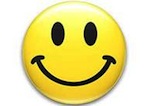 I recently heard a talk by Gary Brill , who teaches psychology at Rutgers, discussing studies showing religious believers are happier than nonbelievers.
I recently heard a talk by Gary Brill , who teaches psychology at Rutgers, discussing studies showing religious believers are happier than nonbelievers.
Defining happiness can be elusive – a feeling that one is happy? Perhaps a more useful concept is well-being, or flourishing, which describes an entire life rather than just one emotion.
Anyhow, Brill did discuss data showing religious believers report greater happiness, suffer fewer psychological disorders (unless you count religious belief itself), recover better from setbacks, cope better with stress, and even have better health and longevity. Religion often does entail rules against harmful behaviors; and imparts a sense of meaning and purpose to life. All this contributes to a positive mental outlook which might affect our immune systems (thus further explaining the health effects). Brill noted that while fervent religious believers get these benefits, weak or conflicted believers are worse off than nonbelievers.
Morality (and feeling moral) is also important to us, and we’re constantly told that religion gives us morality. However, studies have shown that the actual moral behavior of religious believers is no better than for nonbelievers. Furthermore, there is no sign of moral breakdown in those European countries, particularly Scandinavian, where religion has almost vanished from people’s lives. To the contrary, these are among the world’s most orderly societies, with lower social pathologies like crime, substance abuse, teen pregnancy, etc., than in Godly America. (This shows, yet again, that basic morality is built into us by evolution, part of our adaptation of living in groups where social cohesion was vital for survival. We don’t get morality from religion; religion gets it from our human nature.)
Another factor in positive psychology is one’s relationship with truth and reality. We want to feel we are effective agents in negotiating our way through life’s reality. Brill invoked a thought experiment by philosopher Robert Nozick: Imagine a machine that simulates pleasurable experiences, producing sensations and emotive feelings identical to the real thing, or even better. Would you spend your life in the machine? Most people say no. They value truth and reality. This too comes from our evolutionary heritage: for our ancestors, distinguishing reality from illusion could well be a life-or-death matter.
And of course there is obvious dissonance between this truth tropism and religion. Some of us reject the Nozick machine of religious faith, and prefer living in the real world. Must this mean sacrificing the well-being that religion confers, as described above?
Certainly not.
For all those mentioned studies, you have to be careful what effects are really being measured. As Brill elucidated, a key problem is that these tend largely to be studies of Americans. And when it comes to matters religious, American exceptionalism is very real. Brill showed stunning results from a survey asking, “Are you sure God exists?” About 60% of Americans said yes. But in other advanced countries, the yes percentages were so tiny that that belief could be considered eccentric.
(An aside: Why America is so religious is much debated. One thesis is that European social welfare systems are so protective that people feel no more need for divine help, in contrast to “harsh” America. I think that’s nonsense. While religion does thrive in poor benighted environments, Americans don’t have materially harsher existences than cosseted Europeans. The real difference is the First Amendment which, unlike in Europe, keeps government’s stultifying hands off religion, and forces churches to compete with one another. That free market in religion has (as free markets are wont to do) made a far more vibrant, dynamic, and user-friendly religious scene in the U.S.)
Anyhow, America’s unique religiosity has a big effect on the happiness studies. People want to fit in; to belong; to meet societal expectations. In America, that means religion. A key element of well-being is social connectedness; we are deeply social animals (again the evolutionary result of living in groups that had to hang together). What the studies really show is that it’s the social and fellowship aspects of religious participation that confer the benefits – not so much the private, inner belief. Socially isolated believers don’t get those benefits.
So, in America, it’s hardly surprising that the religious believer far more easily taps into all the well-being benefits of fitting in with other like-minded people, than does the nonbeliever, who more often feels like a pariah. No wonder religious folks tend to be happier; but, again, it’s not religious belief per se that causes this, it’s the social penumbra of religious participation.
That’s harder for nonbelievers to replicate, but by no means impossible. You just have to work a little more at it. Humanist groups are scarcer than churches, but they exist. And understanding that our life on Earth is the only one we get makes improving that life, both for oneself and others, the central humanist value. That is all the purpose and meaning anyone needs.
And the rewards of the humanist path are actually greater. One can thereby live authentically, without that annoying tension between belief and reality. For human beings, bio-engineered to care about truth, living in the real world is better than religion’s fantasyland.
First published on The Rational Optimist
